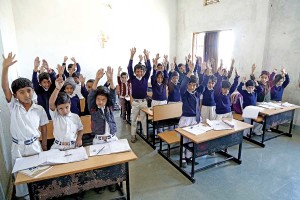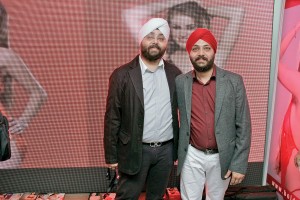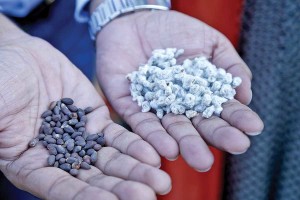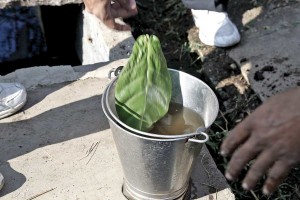 It is not every day that one is faced with a vision… a vision that is truly futuristic, encompassing and a game changer. At Pratibha Syntex, the young and dynamic Managing Director, Shreyaskar Chaudhary has made a commitment to convert the present product line into a 100% sustainable line by 2015 while also reducing the carbon and water footprint by 50% and backing him on this commitment is a motivated team of professionals, right from the farms to the sewing floor. For Pratibha, sustainability is a ‘way of life’ with people, planet and profit at the core of all decisions. During a recent visit to Indore, the headquarters of the vertically integrated Pratibha Syntex, Team Apparel Online was impressed with the passion that was palpable in each and every member of the team that took us around the entire gamut of sustainable initiatives… In a round of interactions spread over two days, right from the farmers who are a part of the organic vision to Shreyaskar himself, AO discovered that the story of Pratibha is much more than just another company aiming to be sustainable.
It is not every day that one is faced with a vision… a vision that is truly futuristic, encompassing and a game changer. At Pratibha Syntex, the young and dynamic Managing Director, Shreyaskar Chaudhary has made a commitment to convert the present product line into a 100% sustainable line by 2015 while also reducing the carbon and water footprint by 50% and backing him on this commitment is a motivated team of professionals, right from the farms to the sewing floor. For Pratibha, sustainability is a ‘way of life’ with people, planet and profit at the core of all decisions. During a recent visit to Indore, the headquarters of the vertically integrated Pratibha Syntex, Team Apparel Online was impressed with the passion that was palpable in each and every member of the team that took us around the entire gamut of sustainable initiatives… In a round of interactions spread over two days, right from the farmers who are a part of the organic vision to Shreyaskar himself, AO discovered that the story of Pratibha is much more than just another company aiming to be sustainable.
“I don’t believe in taking right decisions. I take decisions and then make them right. Believe in yourself. ” A philosophy followed by Alexander and Ratan Tata, is also the philosophy that has guided Pratibha Syntex in its journey of sustainability. “It has not been easy… but the determination to do it has helped us to follow the path which very few in the industry are even thinking about.
With the global condition improving and customer perception about India positive for apparel after a long time…, I am feeling for the first time that it will be US $ 100 million business for us,” says a very upbeat Shreyaskar. Fully conscious that the only way to achieve difficult goals was to engage people, the challenge was to build it into the business model. “With time, I have started understanding how to measure the benefits arising out of engagement and link it to the performance of the individual, which is very important. What is more meaningful is how we spend time on these employee engagement initiatives,” adds Shreyaskar.
Shreyaskar admits that as a nation we really have a long way to go. There is a big gap in the systems and structures that should be in place, and also disconnect between the top management and the grassroots level. “Personally I feel a lot of efforts need to be put in and I need to do a lot more.
Only, last month I started ‘people connect’ initiative and put it in my agenda that every month I need to spend more time with people, so we are starting a workshop from this month called ‘Joy at Work’, that will cover both the workers and the management,” avers Shreyaskar. The initiative is about the freedom of expression and getting joy in the work they are doing, so that people contribute more meaningfully to the organization.

Interestingly, the intent to run the company in a different way was there right, from the day Shreyaskar joined Pratibha Syntex in 1998. However, practical issues of sustaining the company and keeping the factory running pushed him to marketing role and it was only in 2007-08 that people connect initiatives like ‘emotional intelligence program’ that covered 600 workers were started in a more planned manner. Though, there is little doubt that money is one of the biggest motivators, Pratibha found that people who went through the emotional intelligence program would communicate more effectively with other workers. “We need to make sure people are engaged all the time, once that happens then I am sure it has a business case also. It’s a culture shift, money is not the only driver for these value based initiatives, so it takes time,” reasons Shreyaskar. Under project ‘WE – Women Empowered’ which was initiated around 5-6 years ago, the target was to have at least 2000 women in the factory, which initially had only a woman receptionist.

In the journey to be sustainable, there have been many milestones, the first being going vertical. “When I started it was just spinning, then we started organic farming in 1999. In 2001, we started knitted fabric production and in 2002 garments. Since the last 6-7 years it has been about sustainability as a whole that’s the approach. Not just looking at the organic farming but to have the same ethos at the factory level also,” says Shreyaskar.
Farms are where a major thrust is being made by Pratibha that includes not only organic farming, which is considered the hallmark of the company, but also farmer training, basic seed production and social, economic, environmental development (SEED) of the region. “So now we are talking about drip irrigation, looking at health and sanitation, drinking water, covering all aspects and creating these modern clusters. Our target is to establish a holistic, self sustaining farm community by 2015,” informs Shreyaskar. Though these initiatives are as of now funded by Pratibha, efforts are on to engage customers and the Government also as stakeholders.
[bleft]Pratibha stands at less than 55 litres per kg of dyed fabric; well below industy average of 90 litres.
Of total waste generated by Pratibha at the factory, 95% is from spinning and 5% is cutting waste. About 56% of the total waste is recycled and 11% is sent to landfills.[/bleft]
The company is already the proud holder of one of the biggest cotton initiatives in the world through the project Vasudha that engages with 28,000 farmers over an area of 130,000 acres to produce Organic, Fair-trade and BCI cotton. “There have been a lot of challenges on the traceability and integrity in organic cotton, so we started producing our own seeds. Also for greater technical support and model farm development including the reliable quality of seeds for this we have engaged an NGO (agency) who has been associated at the grass root organic farming level, which is helping us. We have been working on Fair-trade cotton for the past 6 years and have managed to build a school at the farm level, which the farming community manages. We also have a warehouse owned by the farming cooperative and if they don’t want to sell, they can stop and store it there. It’s now a self-sustainable model. This is all because of fair-trade as there is a separate fund for the community development,” informs Shreyaskar.
[bleft]Pratibha’s carbon footprint is 2.63 kgs of CO2 emission per 155 gms tee and the energy saved is enough to light 10,500 homes with modern day amenities.
Pratibha’s water footprint is 19.71 litres of fresh water and the annual water savings is equivalent to 77.57 million people’s drinking water quantum for a day.[/bleft]
As of now 30 per cent of the revenues, fibres Pratibha uses are from sustainable products. The commitment is converting completely to sustainable manufacturing in the next 18 months – not organic per se, but sustainable.
“We just started working on viscose and which is not eco-friendly, but the process which we have created took us a year-and-a-half in R&D, helped us introduce Allure that uses 85 per cent less water, 35 per cent less energy, and 80 per cent less effluent is generated.
The pilling standard which is normally 2-2.5 is 3.5-4.5, so the durability of the fabric is far greater making it a much more robust and sustainable product,” avers Shreyaskar.
To make Allure fashion receptive on speed to market, ready stocks are available in 40 solid colours and in mélanges for customers.
 Having committed to reducing carbon and water footprint by 50 per cent and reducing waste by 33 per cent, Pratibha has put in place small interventions along the chain to achieve this goal. “We have been zero discharge for a long time; within zero discharge technically a lot of effluent was being generated which we were sending it to the land fill because it was a completely chemical based system. Now we have created a biological system, the effluent which was generated has been halved from what we were doing initially. So that is very encouraging; 30 per cent of energy requirement is coming from solar. We have already started converting the lights into LED’s, the halogen lamps have been converted to CFL. At the factory level, we have managed to reduce around 7-8 per cent of our energy consumption but are looking for more savings,” says Shreyaskar.
Having committed to reducing carbon and water footprint by 50 per cent and reducing waste by 33 per cent, Pratibha has put in place small interventions along the chain to achieve this goal. “We have been zero discharge for a long time; within zero discharge technically a lot of effluent was being generated which we were sending it to the land fill because it was a completely chemical based system. Now we have created a biological system, the effluent which was generated has been halved from what we were doing initially. So that is very encouraging; 30 per cent of energy requirement is coming from solar. We have already started converting the lights into LED’s, the halogen lamps have been converted to CFL. At the factory level, we have managed to reduce around 7-8 per cent of our energy consumption but are looking for more savings,” says Shreyaskar.
 Dyeing at the processing unit is being done with Avitera dyes, a new revolution in dyeing from Huntsman, since the last 4 months, which has reduced the water requirement by almost 15 litres per kg. Also the time of dyeing is one hour less and the temperature required is only 60 degrees, saving energy (up to 15-20% less). In the meanwhile under another initiative 95% of water needs at the Green Factory is being met by Rain Water Harvesting.
Dyeing at the processing unit is being done with Avitera dyes, a new revolution in dyeing from Huntsman, since the last 4 months, which has reduced the water requirement by almost 15 litres per kg. Also the time of dyeing is one hour less and the temperature required is only 60 degrees, saving energy (up to 15-20% less). In the meanwhile under another initiative 95% of water needs at the Green Factory is being met by Rain Water Harvesting.
[bleft]Organic Cotton Practices for 100% Sustainability
Since there is no benchmark practices of organic cotton at the national level, Pratibha Syntex is following local practices on basis of local soil structure and climatic condition of particular regions to achieve complete sustainability.
• Seed: Non GMO/Non Bt seed are only allowed but under seed production only breeder seed of ICAR Centre/Agriculture University are only allowed.
• Seed treatment: Fungicides and Chemicals are not use in seed treatment. Seed may be treated with cow urine/cow dung or Tricoderma, etc.
[/bleft]
Looking at a bigger picture, sometimes there is a mismatch of interest. Like at the factory level, is increasing productivity more important or giving people time out to de-stress more important…? So again the challenge is how to align both the bigger and the smaller initiatives so that both do not go in different directions completely. “We are doing both of them at the same time. In the factories we have a planning system, which we rolled out in March this year and since then our on-time performance has improved almost 100 per cent. Generally it is 65 per cent but now we are 95 per cent plus. We started with the smaller groups separately and then rolled it out through the factory.
Right from fabric supply, we codified the bins in which the material had to go. In cutting also, first they put it in a common trolley and then to the factory where it had to go, the amount of material movement used to be so much that it consumed time and inventory and impacting the quality because of a lot of movement. So when you earlier decide on that one trolley, when it has to go, it helps in controlling the inventory. For a particular client sewing line if we know 4 trolleys have to go so when the fourth trolley is getting full we know we have to stop cutting. So automatically having that system helped. This was not too big an intervention,” explains Shreyaskar.
The commitment to sustainability is so strong that Pratibha is even ready to sacrifice existing buyers. “Sustainability is a journey, so what is sustainable today may not be sustainable tomorrow. So we have created our own product matrix, looked at what our customers are buying, what are the opportunities, what is the environmental impact and made a new model which over the next 18 months will be rolled out. After that whether our customer wants it or not we will continue to do sustainability and only offer sustainable products. For our existing customers, if it supplies in their price point we will work for them otherwise we will stop working,” says Shreyaskar emphatically. The logic is simple, there is 85 billion dollar of retail committed to sustainability and Pratibha is positioning to get at least one per cent of the business. The confidence of the company is obvious from the fact that Pratibha expects to clock a 40 per cent growth in apparel business this Financial, after stagnating over the last two years.






